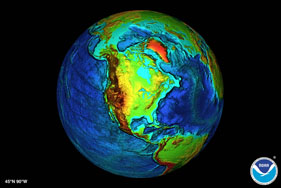2014 on track to be world’s hottest year on record

While the world is on course to break heat records a UN expert says that European emissions targets will fail to protect the climate
The world is on course for this to be the hottest year ever, with global land and sea temperatures for September the highest ever recorded for the month, the National Oceanic and Atmospheric Administration said on Monday.
All of the world’s top 10 warmest years have occurred since 2000. Climate studies have shown the world is poised for more warmth as the amounts of carbon dioxide rise. Last month, figures revealed carbon dioxide levels rose by the highest amount in 30 years in 2013.

Noaa (National Oceanic and Atmospheric Administration) has recorded above-average global temperatures for each September in the last 38 years. The last September with below 20th century average temperatures occurred in 1976, Noaa said.
The government agency said that the temperatures were driven by warming oceans.
In this same week a UN expert has said that Europe’s leaders are about to consign the Earth to the risk of dangerous climate change.
Prof Jim Skea, a vice-chair of the Intergovernmental Panel on Climate Change, says the EU’s plan to cut CO2 emissions 40% by 2030 is too weak.
He says it will commit future governments to "extraordinary and unprecedented" emissions cuts.
The Commission rejected the claim, saying the 40% target puts Europe on track for long-term climate goals.
A spokesman for the Climate Commissioner Connie Hedegaard said: "Our 40% target is in line with science as it puts us right on track to meet our 2050 goal of cutting emissions by 80%-95%.
"This is what developed countries will need to reduce by 2050 according to the IPCC to keep global warming below 2C."
But Prof Skea, vice-chair of the economics working group of the IPCC, said that the EU’s 40% target for 2030 would not lead to the desired cut by the middle of the century.
He said the easy climate protection measures – like energy saving – had been snapped up, leaving to future leaders the job of introducing new clean technologies in every walk of life.
"I don’t think many people have grasped just how huge this task is," he said. "It is absolutely extraordinary and unprecedented. My guess is that 40% for 2030 is too little too late if we are really serious about our long-term targets."
Prof Skea believes governments are setting targets by what appears to be politically achievable rather than what is necessary to transform the way we make and use energy as the century unfolds.
Valere Tjolle
Great sustainable offers this week: 93% off reports and guides here Keys to sustainably successful destinations revealed here Going to WTM, want to attract high value green tourists? here
 United Kingdom
United Kingdom United States
United States Asia Pacific
Asia Pacific












































Dozens fall ill in P&O Cruises ship outbreak
Turkish Airlines flight in emergency landing after pilot dies
Boy falls to death on cruise ship
Unexpected wave rocks cruise ship
Storm Lilian travel chaos as bank holiday flights cancelled